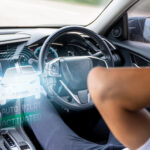Fully self-driving cars are set the hit the road within four years, but most Americans aren’t ready to buy them.
The majority of U.S. consumers remain wary of the developing technology, with 55 percent of drivers surveyed by consultant AlixPartners saying they’re unlikely to consider a driverless car when they come to market. Echoing other recent consumer polls, nearly half of those surveyed said they aren’t confident that an autonomous car could drive them safely, with fear of hacking and software malfunctions among the leading concerns.
“When it comes to autonomous vehicles, traditional auto companies and suppliers have a big two-front battle ahead of them: educating the consumer about autonomous vehicles and figuring out how to compete in the software end with highly-advantaged tech companies,” Mark Wakefield, managing director and co-head of the automotive practice at AlixPartners, said in a statement.
Automakers and tech giants are pouring billions into developing self-driving cars, which are seen as a solution to growing gridlock and rising vehicle deaths. U.S. roadway fatalities jumped 14 percent over the last two years, with more than 40,000 people dying in crashes in 2016 — largely the result of human error. But that won’t change until manufacturers can get drivers comfortable with the nascent technology.
All too familiar with dropped calls and laptop meltdowns, 84 percent of consumers fear a software malfunction in a driverless car. Eight in 10 are worried about a hardware breakdown and 77 percent fret their car would be hacked, the AlixPartners survey of more than 1,500 U.S. drivers found.
The key for companies to win over skeptics is to take them for a ride with a robot at the wheel, according to AlixPartners, which administered the study in July and August. Of those respondents who had ridden in a self-driving car, 49 percent came away confident about their safety in such a vehicle, nearly twice the level of those who had never gone driverless.
Consumers have more faith in tech giants such as Alphabet Inc. and Apple Inc. than automakers to develop self-driving software, with 78 percent saying they would trust them more to handle the coding for such a car. Traditional automakers such as General Motors Co. and Ford Motor Co. were trusted most to develop the hardware for driverless cars. Ride-hailing services such as Uber Technologies Inc. and Lyft Inc. were trusted by just 1 percent of respondents to develop either the software or hardware of robot rides.
“Traditional auto will have to undertake massive operational and organizational changes to afford the autonomous-vehicle investments, be successful with partnerships and not get left out of the profitable parts of the new automotive ecosystem,” Wakefield said.
Topics USA Auto Tech Personal Auto
Was this article valuable?
Here are more articles you may enjoy.


 AIG’s Zaffino: Outcomes From AI Use Went From ‘Aspirational’ to ‘Beyond Expectations’
AIG’s Zaffino: Outcomes From AI Use Went From ‘Aspirational’ to ‘Beyond Expectations’  Judge Tosses Buffalo Wild Wings Lawsuit That Has ‘No Meat on Its Bones’
Judge Tosses Buffalo Wild Wings Lawsuit That Has ‘No Meat on Its Bones’  Carmakers Push Toward ‘Eyes-Off’ Driving, Raising Questions of Safety, Liability
Carmakers Push Toward ‘Eyes-Off’ Driving, Raising Questions of Safety, Liability  US Supreme Court Rejects Trump’s Global Tariffs
US Supreme Court Rejects Trump’s Global Tariffs 

